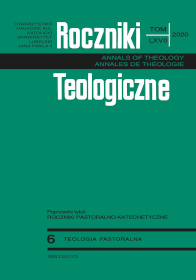Ksiądz Franciszek Blachnicki – prekursor teologii kerygmatycznej w Polsce
Father Franciszek Blachnicki – a Forerunner of Kerygmatic Theology in Poland
Author(s): Bogdan BielaSubject(s): Christian Theology and Religion, Theology and Religion, Pastoral Theology
Published by: Towarzystwo Naukowe KUL & Katolicki Uniwersytet Lubelski Jana Pawła II
Keywords: kerygmatic theology; catechumenate; Light-Life Movement; parish
Summary/Abstract: Pope Francis said, “Theology after Veritatis Gaudium is a kerygmatic theology, a theology of discernment, of mercy and of welcoming, in dialogue with society, cultures and religions for the construction of the peaceful coexistence of individuals and peoples” (21.06.2019). In this context, a forerunner of kerygmatic theology in Poland, Father Franciszek Blachnicki (1921-1987), seems to be a person to focus on. As a theoretician, he came up with foundations of fundamental catechesis, in which he emphasised the fact that contemporary forms of catechumenate do not fit the requirements of the contemporary times. Blachnicki knew that the central pastoral issue of the Church is loss of the environment of living faith and love that may welcome new generations of Christians. The existing system of catechesis for children and youth is understood as a school subject to be taught purely on an intellectual level is not able to meet the tasks of catechumenate, since it is not an educational system that introduces Christian life in the community of the Church. In view of the above, Blachnicki was convinced that an additional catechumenate for the baptised was necessary – both for adults, youth and children. This complementary catechumenate should use the guidelines offered by the post-conciliar teaching of the Church, especially the one offered in the document on Christian initiation of adults. As the result of this, in the sixties of the last century, Father Blachnicki used the scheme of “Oasis” retreat to found the Living Church Movement, later known as the Light-Life Movement. Within the framework of deuterocatechumenal formation, he showed a specific way of implementing postulates, resulting directly from the achievements of kerygmatic theology and offered a “catechumenate-oriented” concept of pastoral care able to renew the contemporary parish that is a community of communities.
Journal: Roczniki Teologiczne
- Issue Year: 67/2020
- Issue No: 6
- Page Range: 37-54
- Page Count: 18
- Language: Polish

